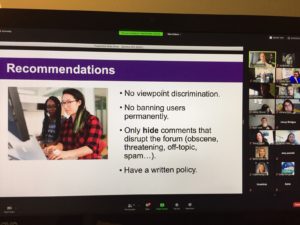
By Margaux Nersesian, Strategic Communication major, Class of 2021
This summer, the tables were turned on both the instructors and students of TCU’s Certified Public Communicator® Program due to COVID-19 restrictions. The CPC’s team of instructors worked hard to adjust this summer’s program in order to provide a beneficial course experience for the student professionals. They adapted by utilizing communication technology to conduct an abbreviated session for this year’s new cohort of communication professionals. Normally, TCU hosts the program in-person, gathering two cohorts of students from across the nation who work as public information managers and communication professionals for cities, counties, school districts, and other public and public-private agencies and organizations. Dr. Jacque Lambiase, director of the Certified Public Communicator® Program, explains that student-professionals “have some of the hardest jobs in our discipline of strategic communication. Everybody, every resident, every parent is in their audience, so they don’t get to target any particular audience. They are in the public square, communicating difficult information every day. So, the most important learning we do focuses on helping them to become more confident in their communication leadership, and we hope to give them many ways to work smarter, rather than harder.”
Rather than canceling this summer session, the professors switched to hosting it on Zoom in July in order to pursue the course objective, which includes strategic communication plan-building, professional growth, and goal-setting. Dr. Lambiase, Dr. Julie O’Neil, Dr. Josh Bentley, Col. Chris Naler, and Sarah Osborne, director of communications and media relations for the City of League City, Texas, worked together to teach sessions via video conferencing and to adapt the course for the given circumstances. An additional change to the format of the class this year was postponing the final session and the graduation of the returning cohort of students. Rather than hosting both the cohort of new students and the cohort of graduating students, this summer session was only for the new students entering the program. The board of directors made this change to accommodate the graduating cohort of students, who faced an increased professional workload due to COVID-19. “Our student-professionals have been slammed with dealing with COVID-19. They work for cities, counties, and school districts, so those entities had massive adjustments to make to keep their communities or schools in operation. So, most people in cohort 7, which should have graduated this summer, did not have adequate time to finish working on their communication plans,” Dr. Lambiase explains. A final communication plan is a requirement for graduation.
The program enacted additional changes to its structure and course material. The session for the new group of cohorts was reduced to 15 hours over one week rather than the typical 40 hours. The online medium had its limitations, preventing some activities from being included in this session. Ideally, the skipped material will be made up in the future, either this winter or next summer. The CPC program staff is still awaiting guidance from TCU as to when the program will continue for both cohorts.
Through all the adversity this summer session faced, the student-professionals and faculty found it to be a remarkable success. Melissa Hoelting, a CPC student who works as the community relations manager at the Town of Castle Rock, said, “It’s been the best professional development experience I’ve had – and this is just week one!” The group utilized Zoom breakout rooms to work on group projects and foster networking and relationships. Dr. Lambiase felt the course offered professional and emotional support to the student-professionals. “I think they needed a break from handling heavy stuff, such as COVID-19. Many of them were also responding in social channels to social justice issues, which is a lot of emotional labor. They had been actively participating on executive teams to provide leadership about these issues, too, and hadn’t had a break for months,” she said.
While excited to get back to the normal schedule and format, the CPC faculty expects to continue to use some things they learned through this unusual format. “We will continue to use Zoom for mentoring sessions in the future. Our students are from across the country, so that’s a great way for us to stay in touch,” said Dr. Lambiase. Additionally, they may even continue to do at least some virtual instruction even when the course returns to its in-person format. However, the immediate future for the course remains somewhat uncertain but the goal is to return to the in-person experience this January or next summer.
